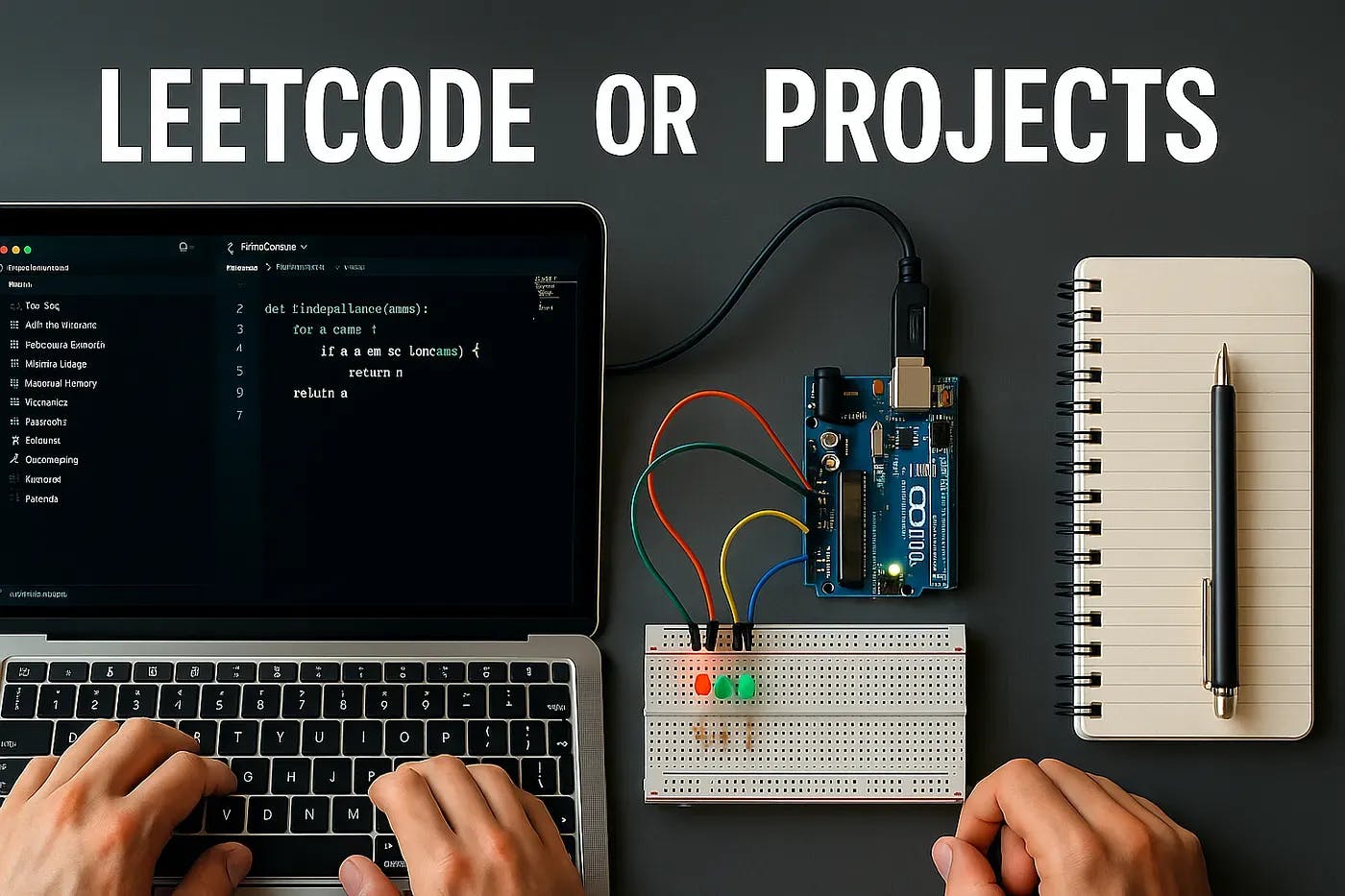What Recruiters Want to See, And What They’re Ignoring?
Ethan and Rohan are both applying for tech jobs.
- Ethan is grinding LeetCode because that’s what big tech companies ask in interviews.
- Rohan thinks LeetCode is a waste of time. He’s busy building a powerful Chrome extension because he believes cool projects get you hired.
So, who’s right? And more importantly, who’s more likely to get a good job?
Let’s break it down.
LeetCode vs Projects: What Most People Get Wrong
Zoom image will be displayed
Every company has a hiring funnel.
- At the top is résumé screening.
- At the bottom are technical interviews.
LeetCode helps you crack interviews.
Projects help youget interviews.
If your résumé has no strong projects, you might get rejected before you even make it to the interview. Doesn’t matter if you’ve solved 500 LeetCode problems, nobody will ever know.
On the flip side, if your résumé has solid, real-world projects, but you haven’t done any interview prep, you might bomb the actual interviews, especially at big tech companies.
Why Projects Matter?
When a recruiter sees your résumé, they’re looking for proof that you can build things that matter. A strong project shows:
- You know how to work with real tools.
- You can take an idea from scratch and turn it into something usable.
- You can solve actual problems, not just toy algorithm questions.
For example, a machine learning project that detects skin cancer is going to stand out more than a line saying “500 LeetCode problems solved.”
It shows you can write production-quality code. And that gets attention.
Why LeetCode Still Matters?
Here’s the catch, getting the interview is only half the battle.
Once you’re in, most big companies test your problem-solving and algorithmic thinking. That’s what LeetCode helps you practice.
It’s not about whether you’ll use these exact problems on the job. It’s about how you think. Big tech companies assume that if you can solve tough algorithm questions, you can learn anything else on the job.
So if your goal is to work at companies like Amazon or Google — you have to do LeetCode. Period.
Every Company Is Different
Not every company hires like big tech.
- Startups often skip LeetCode-style interviews.
- They care more about your ability to build and ship features fast.
- Interviews might revolve around your portfolio, side projects, or take-home assignments.
That’s because startups don’t have time (or budget) to train new hires for months. They need people who can jump in and start building right away.
Also, the role matters:
- Front-end roles might focus more on JavaScript, DOM, and CSS. LeetCode questions tend to be simpler, or nonexistent.
- Back-end roles are heavier on algorithms, data structures, and system design. LeetCode is a must.
Become a T-Shaped Programmer
You want to become what’s called a T-shaped programmer.
- The horizontal bar of the T is your broad problem-solving ability, from LeetCode.
- The vertical bar is your deep expertise, shown through projects.
This combination makes you very attractive to employers.
With LeetCode, you show that you can think under pressure and solve hard problems. With projects, you show that you’ve already done work similar to what they need.
How to Balance LeetCode and Projects?
Start by asking:
What type of company are you targeting?
If you’re targeting big tech:
- Spend 70% of your time on LeetCode,
- And 30% on projects.
Their interviews are standardized and algorithm-heavy. You’ll need strong prep.
If you’re targeting startups:
- Spend 70% on projects,
- And 30% on LeetCode.
They care more about speed, feature-building, and real-world problem-solving.
And if you’re going for roles where LeetCode doesn’t matter at all (e.g., some front-end roles)? Then go all-in on building.
How to Combine LeetCode and Projects?
Here’s a trick:
Build projects thatrequire algorithmic thinking.
For example:
- A rate limiter needs a sliding window algorithm.
- A web crawler might use BFS (breadth-first search).
These projects:
- Make your understanding of algorithms stronger.
- Give you real examples to talk about in interviews.
Imagine getting a BFS question (Breadth-First Search) and saying,
“I used this algorithm in my web crawler project.”
That hits harder than just repeating a memorized solution.
Final Strategy
Don’t pick one side. Pick both.
- LeetCode in the morning, when your brain is fresh.
- Projects in the evening, when you can go deep.
- Or alternate days, whatever keeps you consistent.
The people who win in job hunting don’t choose sides.
They build strong projectsand prep smart for interviews.
That’s how you actually get hired.


